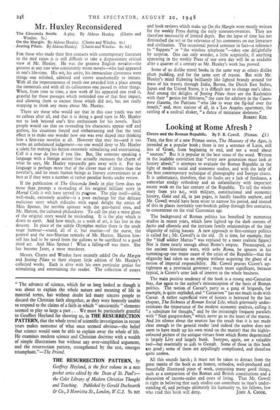Mr. Huxley Reconsidered
On the Margin. By Aldous Huxley. (Chatto and Windus. 6s.)
FOR those who made their first contacts with contemporary literature in the mid 193os it is still difficult to take a dispassionate critical view of Mr. Huxley. He was the greatest English novelist—the greatest at any rate who consistently wrote novels—who had appeared in one's life-time. His wit, his satire, his immaculate cleverness were things one relished, admired and strove unashamedly to imitate. With all the impetuousness of youth one awarded him a place among the immortals and with all its callousness one passed to other things. When, from time to time, a new work tof his appeared one read it, grateful for those passages which reminded one of that first impact, and allowing them to excuse those which did not, but not really stopping to think any more about Mr. Huxley.
There are those who would say that in this case youth was not so callous after all, and that it is doing a good turn to Mr. Huxley not to look beyond one's first enthusiasm for his novels. Such people would say that on re-reading his characters appear stiff and gutless, his situations forced and embarrassing and that the total effect is to make one wonder how one was ever duped into thinking him a first-rate novelist at all. However that may be—and it too seems an unbalanced judgement—no one would deny to Mr. Huxley a talent for making his fiction extremely stimulating and entertaining. Call it a tour de force if you like. But, like someone speaking a language with a foreign accent that actually increases the charm of what he says, Mr. Huxley repeatedly gets away with it. For his language is perhaps more that of the clever man of letters than the novelist's, and he treats human beings as literary conveniences or at best as if they were a number of rather peculiar books under review.
If the publication of The Gioconda Smile in play form does no more than prompt a re-reading of his original brilliant story in Mortal Coils it will have served its puipose. The play itself—solid, well-made, extremely actable—is a poor exchange for that delicate malicious story which ridicules with equal delight the antics of Miis Spence, the terrible spinster with the gun-barrel eyes, and Mr. Hutton, the cultured philanderer. To call the play a mere ghost of the original story would be misleading. It is the play which is down to earth. And how much, as a.work of art, it has lost in the descent. In place of the subtle Olymtilan malice there is the stock stage humour—sound, all of it, but routine—of the nurse, the general and the neo-Shavian remarks of Mr. Hutton. Hutton him- self has had to be saved from the gallows to be sacrificed to a good third act. And Miss Spence ! What a falling-off was there. She has become Janet, a mere murderer.
Messrs. Chatto and Windus have recently added On the Margin and Jesting Pilate to their elegant little edition of Mr. Huxley's collected works. Each is alive with his own particular genius for stimulating and entertaining the reader. The collection of essays and book reviews which make up On the Margin were mostly written for the weekly Press during the early nineteen-twenties. They are therefore necessarily of limited depth. But the lapse of time has not diminished the wit or the relevance of his comments on our literature and civilisation. The occasional period sentence in fact—a reference to " flappers " or "the wireless telephone "—takes one delightfully by surprise. One can only wonder, a little sceptically, if anything appearing in the weekly Press of our own day will be as readable after a quarter of a century as Mr. Huxley's work has proved.
Some of us dislike travel books in the same way as others dislike plum pudding, and for the same sort of reason. But with Mr. Huxley's mind flickering brilliantly like lighted brandy around the mass of his travels through India, Burma, the Dutch East Indies, Japan and the United States, it is difficult not to change one's ideas. And among the delights of Jesting Pilate there are the Kashmiris with their "genius for filthiness," the cure for adultery in the Cawn- pore Gazette, the Puritans "who like to wear the fig-leaf over the mouth," and, most sinister of all, in a 'Los Angeles apartment, the rattling of a cocktail shaker, "a dance of miniature skeletons."
ROBERT KEE.


































 Previous page
Previous page